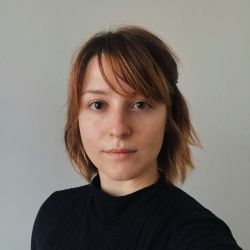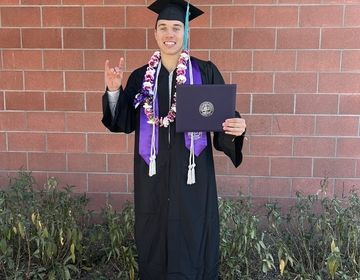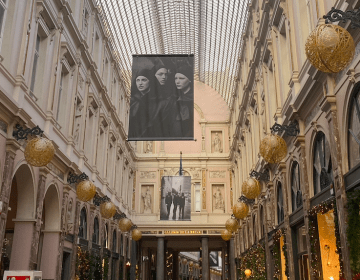Fuera de fronteras, más allá del binario; My Non-binary Identity Abroad
Exploring the world is supposed to teach you about yourself. When travelling (and teaching) abroad, parts of your identity that you may not have questioned before can come to light. Culture shock can quickly devolve into an identity crisis—or, inversely, it may be incredibly liberating, and act as a catalyst to allow you to find your authentic self.
Being nonbinary is a part of my identity, and plays a role in how I navigate the world. I’ve identified this way, using she/they pronouns, for about three years now, but have generally lived my adult life without personally assigning myself to any particular gender role. I simply happen to be nonbinary. Of course, I can’t control the way others interact with me based on their perception of my gender and it would be impossible to deny the effect the socialisation that growing up ‘as a girl’ has had on my development, and my personal contextualisation of my gender. In this way, being nonbinary doesn’t change who I am, or used to be, but it regardless provides a certain perspective from which I gauge my life experiences.
This isn’t to say that I’m not still treated or perceived as a woman–I am. I’m included in the womens’ conversations at work and invited to girls nights out. I still have been groped on public transit and catcalled (despite the criminalisation of street harassment in Madrid) (androgyny, whether outward or internalized, is only so inviolable a barrier to gendered violence, unfortunately). When dating, people are more or less attracted to me, if they are attracted to me, because they see me as a woman. My body often betrays an identity that is not always what I wish to elicit.
Coming to Spain, I did have some anxiety as to whether I would be accepted. I feared the strong culturally catholic influences on daily life and tradition. I worried about fitting in, not only socially but also in the workplace, as being an LGBTQ+ member of staff at a school, especially around younger children, can be a point of contention for many people. In my home state of Florida, after all, the “Don’t Say Gay” bill was recently passed, outright banning discussions of gender and sexuality in schools, allowing parents to sue educators or schools for doing so, thereby laying a foundation for potentially similarly discriminatory legislation affecting other areas of life and citizenship–in a way, I’ve been all too familiar with the fact that many people simply do not see LGBTQ+ issues as palatable, let alone the individuals themselves. By that measure, making a good impression in a professional environment often involves adhering to the status quo–gender included.
While here, surprisingly, I’ve largely kept my identity—at least when it comes to gender and sexuality—to myself. I’m not really vocal about my identity in general, nor (do I think, at least) do my mannerisms or personal avenues of expression really betray anything particular about that part of me. And it’s not that the social situation here is hostile to it, but rather, on the contrary–whenever my identity in conversations comes up, people are usually respectful and receptive. It just seems to be less of a big deal here–people don’t care so much. Being yourself (as an LGBTQ+ person, or any person that differs from the white, straight, and cisgendered norm) isn’t seen as a political statement or an offence to others’ sensibilities as it often is in the United States. If anything, embracing your identity is usually seen as an act of self-empowerment, and is greeted with positive reception.
However, this may just be my experience on an individual level. So many factors are at play; I’m not very overtly ‘out’, and perhaps if I was, I would be treated differently. I could have applied to a different program, been placed in a catholic school, a different school, or a smaller community, where I may have had to suppress my identity in order to be welcomed. I could have met people who made me feel uncomfortable or who discouraged my gender expression–I’m sure they exist in Spain, as well. I could have, instead of teaching abroad, chosen to teach back home and be subjected to discriminatory legislature. Just as I happen to be nonbinary, I happen to be lucky. There is no guarantee that you will fit in as an individual in any given environment, but it absolutely helps to know that you will be accepted as you are.
My generally positive experience could also be due to my placement in Madrid; this city is a metropolis, for sure, and there are quite a lot of foreigners and diverse groups within the community. Compared to other major cities in Spain, it’s less conservative, and generally less religious. As the capital, it’s politically active–there are protests almost every weekend, for any and every cause. So, in general, I would call it a progressive, open-minded city.
It’s worth noting that the topic of gender expression in Spain (and in the EU at large) has recently garnered more attention in a larger, political sense. In Summer of 2021, the Spanish government approved a bill to allow individuals to change their gender on identifying documents, without having to undergo medical transition or physical gender affirmation procedures. This bill, however, still did not leave room for non-binary individuals, as the gender markers remained ‘male’ or ‘female’, with no other option.
Socially, when it comes to current attitudes about non-binary individuals, or LGBTQ+ issues at large, Spain is fairly receptive. At least, according to the IPSOS 2021 LGBTQ+ global report 3% of the approximately 1000 Spanish people surveyed responded they identified as a gender that was neither male nor female, and 18% said they knew of someone who was transgender or non-binary. 22% of those surveyed said they attended an event to support LGBTQ+ people, and by far, the survey noted that Spain had the highest percentage of respondents (73%) who support LGBTQ+ people being open about their sexual orientation or gender identity with everyone, which was higher even than the survey’s global average of 51%. There were several other encouraging statistics about personal, business, and political values when it came to LGBTQ+ support.
There may be some reasons why being non-binary is not as common in Spain as it is in the United States. From solely a statistical standpoint, in the States, non-binary is a distinct identifier, which is not necessarily associated with or seen as implicit to being transgender (although some may identify as both). This allows for individuals to be counted separately, and therefore, have more visibility as distinctly non-binary. But culturally, there are differences as well. Women and girls are socialised differently, and hold a different cultural power or social currency than women in the States. Gender roles, although distinct, are obviously different between the two countries. Spain ranks higher than the US in gender equality, among the top ten countries for equal rights between men and women. The Spanish Feminist movement is incredibly strong, and has springboarded policies (a recently approved policy allowed for paid menstruation leave and increased accomodations for working women for example) that would likely seem radically progressive to an American citizen. Understanding that political representation invariably affects the empowerment of the individual as well as social and psychological dynamics within a society, it follows that identifying as a woman in Spain is likely more empowering for someone than if they were to do so in the United States. Gender is a social construct after all, so to deny the effect that a society’s politics and culture has on whether or not an individual would identify as any specific gender would be to ignore the very nature of it. It may be that less people identify as non-binary because the disparity between genders is smaller, thereby reducing to even eliminating a political influence on gender identification and leaving it up to cultural or social factors.
Personally, much of my nonbinary identity, as much as it is a rejection of gender at large, is disassociation from my inherent womanhood. I once ‘was’ a woman, but am now not. I am, in effect, the body and brain of a woman that has consciously and purposefully rejected its label. But, the gender binary from which I am supposedly distancing myself is a cultural, social construct. And so, with a change of social and cultural context, from one binary (United States) to another (Spain), does it still exist? It’s certainly not the same.
I can identify with Spanish conceptualizations of femininity and womanhood, and feel protected socially and culturally as a person who is often perceived as a woman. It’s made me question what it means to me to be non-binary; is it simply the act of appearing androgynous? The attempt to eschew assigned gender roles? The true, inherent need for identification beyond a binary? I have much to answer for myself.
Whereas I first realized my nonbinary identity in the United States, where I understand cultural constructs of femininity and womanhood and of gender more thoroughly, in Spain, my exploration of it continues, from a perspective of not understanding those norms inherent to growing up and experiencing socialization firsthand.
Exploring the world and teaching abroad is an experience that allows me to reflect, learn new things, and grow--and my identity is yet another part of that journey.
For those considering teaching abroad with CIEE, if you’re non-binary, or fall under the general LGBTQ+ umbrella, there are plenty of spaces and communities for you to find common ground and solidarity while living in Madrid.
Chueca is effectively the gayborhood of Madrid, and there are plenty of clubs, cafes, centres, and social spots to explore there–besides the city at large. There are also quite a few youth and political organisations keen to demonstrate or organise for LGBTQ+ issues.
Online, there are also plenty of resources. Check out the Auxiliares de ConverGAYsion group on Facebook. Or try establishing your own group chat in your CIEE cohort.
There are definitely other nonbinary individuals in Spain, and possibly even people who will come with you when teaching abroad. And if you, now, are in the same position I was then, by all means feel free to reach out and chat.
Related Posts
Self Intro!
A little bit about me :) I am from Sacramento CA, and I love basketball, history, writing, and hiking! I arrived on August 12th and had so fun and memorable experiences already! try to get out of your comfort zone and try new things in all aspects of life!!
Moving to Madrid, Spain from Tennessee
This will be one of a few blog posts that I make when I primarily talk about myself, I promise. Right now, I am less than a week away from... keep reading
48 Hours in Belgium
Because Madrid has a number of bank holidays, us language assistants benefit from days off of school which are in turn, great times to travel and explore different places for... keep reading



